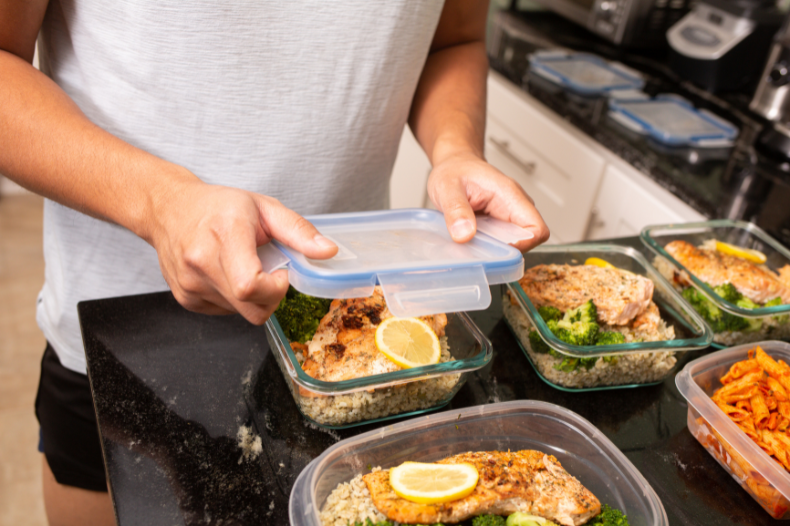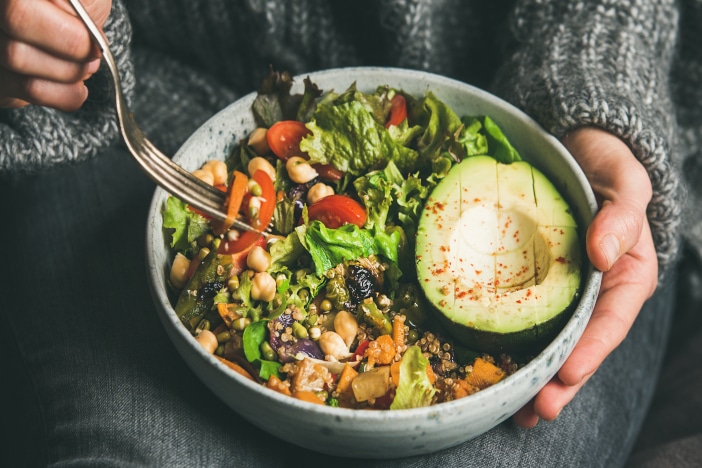- Review – Quiz
- The importance of situational eating behavior
- Conscious handling of eating out: 10 tips for restaurants and canteens
- 9 alternatives for frustration eating
- Meal Prep – Healthy meals and snacks always at hand
- Together we are stronger
- Mindful and Healthy – Better eating behaviour in every situation
- The Essentials (brief)
- 5 simple things you can implement
- Your Homework
1. Review - Quiz
Smaller plates, hand method or MyPlate – what are these about and how do the methods work again?
Food accompanies us through everyday life – be it in the canteen, in the restaurant or in emotional moments when we are frustrated or bored. This lesson is about how you can recognize and positively influence your eating behavior in different situations. No matter whether you are standing in the canteen with colleagues during your lunch break or dealing with emotions. Here you will find practical tips for making healthy decisions in every situation.
2. The importance of situational eating behavior
Eating is not only a vital act, but often also an expression of emotions, habits and social situations. Situational eating behavior plays a crucial role in our health and well-being.
We tend to eat differently in different situations. A conscious understanding of how different situations can influence our eating behavior is the first step towards a healthier diet.
2.1 Influence of different situations on our eating behavior

Our eating behavior is closely linked to the diverse situations we encounter in everyday life. These situations can have a significant impact on the type and amount of food consumed.
- Canteen or restaurant: Currywurst or salad? The choice can be influenced by external factors such as limited time (long line at the salad bar vs short line at the Currywurst) or the offer (there is simply no salad bar), leading to decisions that do not always meet our needs.
- Your emotional state: Emotions such as frustration, sadness or boredom can have a strong influence on our eating behavior. In moments like these, many people seek comfort in food. It is important to recognize when emotional factors influence our eating behavior in order to make more conscious decisions.
- Social occasions: At celebrations, barbecues or other social events, rich dishes are often the focus. The social aspect of eating can lead us to eat more than necessary – simply because everyone is doing it.
- Routine and habits: Our daily routines can also influence eating behavior. Eating quickly between appointments or snacking in front of the TV are examples of how habits emerge in different situations.
Understanding these connections allows us to be more mindful of our eating behavior and make healthier decisions. In the next section we will discuss strategies on how you can positively influence your eating behavior depending on the situation.
3. Be careful when eating out: 10 tips for restaurants and canteens

- Planning ahead is key: Before going to the restaurant, look at the menu online and decide in advance which healthy options you will choose.
- Choose smaller portions: Make conscious choices about smaller portions or sharing a meal with someone else to avoid overeating.
- Drink water before eating: A glass of water before a meal helps to fill the stomach and promote satiety.
- Question about adjustments: Don’t be shy about asking for adjustments to dishes to make them healthier, e.g. B. with less oil or without certain sauces.
- Set priorities: Focus on protein-rich options, lots of vegetables, and whole grains to choose a balanced meal.
- Enjoy consciously: As soon as you’re doing something other than concentrating on eating, clear away the leftovers and store them in the fridge if necessary. As soon as something is more important than food, you are sufficiently full!
- Avoid distractions: During the meal, turn off your phone and focus on enjoying the food without being distracted.
- Order sauces separately: If possible, order sauces or dressings separately to keep quantity under control.
- Leave room for dessert: If you enjoy dessert, plan ahead so that this part of the meal fits into your healthy eating plan.
- Avoid dishes with these descriptions:
- Deep fried
- Fried
- Gratinated
- Creamy
- Breaded
- Sweet
4. 9 Alternatives for frustration eating
- Distraction through hobbies: Engage in hobbies or activities that fascinate you to prevent emotional eating.
- Breath deeply: Take a minute to take deep breaths to reduce stress and manage emotional triggers.
- Keep a mood journal: Keep a journal of your moods and identify patterns to deal with emotions more consciously.
- Have healthy snacks ready: Have healthy snacks on hand to manage cravings without resorting to unhealthy options.
- Positive Affirmations: Use positive self-talk to manage negative emotions.
- Exercise as a stress reliever: Incorporate regular exercise into your daily routine to reduce stress and promote emotional balance.
- Looking for community: Share your emotions with friends or family to gain social support and reduce the need for emotional eating.
- Development of relaxation techniques: Learn relaxation techniques such as meditation or progressive muscle relaxation to release emotional tension.
- Mindful Eating: Mindful eating is about enjoying consciously and attentively.
- Eat slowly and chew thoroughly – this way you will know when you are full.
- Enjoy every bite – Focus on aromas, texture and taste
- Don’t get distracted – cell phones, televisions, etc. are taboo!
- Listen to yourself – Pay attention to the signals your body is sending you
- No more multitasking – Be in the moment, just you and your meal
5. Meal Prep - Healthy meals and snacks always at hand

Planning meals ahead of time (meal prep) helps prevent spontaneous and unhealthy decisions. What do you need to know for this?
- Plan your week: Sit down on the weekend and think about what you want to eat in the coming week. Also consider your lifestyle: When are you home? When do you have a lot of time to cook and when do you have less time? What dates are coming up? Find healthy recipes that you want to cook.
- Incorporate diversity: Vary your meals to ensure you get all the nutrients you need.
- Create a shopping list:Not only does it help with organization, but it also ensures that nothing unplanned spontaneously finds its way into the shopping cart.
- Prepare snacks: Prepare healthy snacks like fruit, vegetable sticks, or nuts and store them in portable containers. This means you have something healthy to hand when you get a little hungry.
- Pre-cook and stew meals: Soups, bowls, salads, breads, … – you can prepare all of these easily for 1-2 days. Simply pack it in a Tupperware container and you can easily take your food with you to the office, for example. And you also save yourself cooking in the evening when you only have to heat up your pre-cooked food.
6. We are stronger together
It’s much more difficult to “fight” your way through a change in diet on your own – because let’s be honest, sometimes it feels like a small, daily battle with your inner weaker self. So try to find like-minded people! No matter whether it is online or offline.
In a supportive group you can help each other eat more consciously. The exchange of experiences and tips plays a major role. Goals set together motivate and help to implement positive changes. When things get difficult, you can support and motivate each other in the group.
Whether online or offline: Plan joint activities with your group that have nothing to do with food, such as doing sports together or going on excursions. This way you can strengthen your relationship and give each other new ideas.
Together you can support and motivate each other, be more conscious about food and develop healthier eating habits in the long term. Always remember: You are not alone on your journey – together we can do it!
Mindful and healthy – better eating behavior in every situation
Situation-dependent eating behavior not only shapes our daily food intake, but also significantly influences our health and well-being. Consciously engaging with different situations, whether in the cafeteria, at social events or when you are emotionally upset, allows you to make healthier decisions.
Strategies like planning ahead, choosing smaller portions, and consciously drinking before eating will help you when you can’t eat at home. Mindful eating, supported by techniques such as conscious enjoyment and deep breathing, promotes more conscious food intake.
Community and support from friends, family or social networks is very important for your weight loss success. The exchange of experiences and the joint planning of not eating-related activities motivate you.
Make conscious decisions and change your behavior – this way you can not only improve your diet, but also your well-being!
The essentials (brief)
- Situation-dependent eating behavior: Eating is not only an essential act of life, but is also strongly influenced by various situations, including visits to the cafeteria or restaurant, your emotional state, social occasions and daily routines.
- Factors influencing your eating behavior: External factors such as limited time, supply and social pressure can influence eating habits.
- Be careful when eating away from home: Tips like planning ahead, choosing smaller portions, drinking before eating, and prioritizing healthy options will help you make healthy choices outside of your meal.
- Alternative strategies for eating for frustration: Distraction through hobbies, deep breathing, mood journaling, healthy snacks, and positive affirmations can help prevent emotional eating.
- Mindful Eating: Techniques such as conscious enjoyment, no distractions during meals and listening to your own body signals promote conscious eating.
- Meal Prep: By planning meals ahead of time and preparing healthy snacks, you can prevent spontaneous and unhealthy decisions.
- Conscious decisions to change behavior:Consciously addressing your own eating habits and implementing strategies can not only improve your diet, but also your general well-being.
5 simple things you can implement
- Advance planning and menu check: Before you go to a restaurant or order food, take a look at the menu. Decide in advance which healthy options you want to choose.
- Smaller portions: Make conscious choices about smaller portions or sharing a meal with someone else to avoid overeating. This helps keep control of calorie intake.
- Drink before eating: Drink a glass of water before eating. Not only does this help fill your stomach, but it also promotes satiety, which can lead to you eating less.
- Ask about customizations: Don’t be afraid to ask for adjustments to dishes to make them healthier. This could be less oil, light sauces or more vegetables.
- Set priorities: Focus on protein-rich options, lots of vegetables, and whole grains to choose a balanced meal. This helps ensure you get the nutrients you need, regardless of external circumstances.
Your homework
Photograph your meals and drinks this week:
- Pay attention to restaurant visits, cafeteria meals, social occasions and particularly emotional moments
- After half a week, analyze the pictures. Identify patterns or situations in which you tend to make poor decisions.
- Set improvement goals for the second half of the week, for example: “In the canteen, I always choose the healthier option instead of an unhealthier option.”
- Implement your goals.
- Reflect: What challenges have you encountered? What worked well? Have you noticed any positive changes in your eating habits? Write down your findings and reflect on how you can maintain these new habits.






